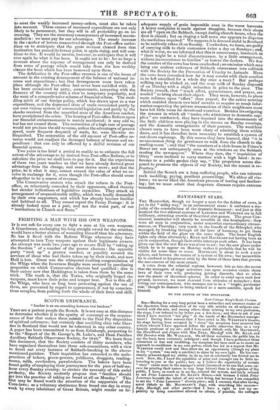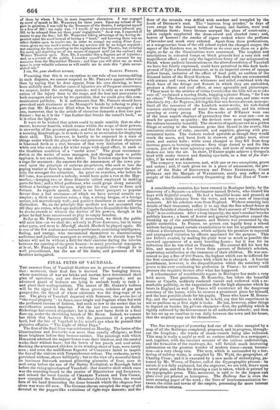HAYMARKET STARS.
THE Haymarket, though no longer a mart for the fodder of cows, is yet in the " milky way," in an astronomical sense : it embraces a ma- jority of the constellations of the dramatic firmament ; and just at this moment the two sidereal systems of LAPORTE and WEBSTER are in full brilliancy, attracting crowds of theatrical star-gazers. The great Con- tinental luminaries will shortly be invisible in this hemisphere : they were all seen in conjunction, under somewhat extraordinary circum- stances, on Thursday ; very much to the benefit of the Sidrophel, who managed, by breaking through all the laws of harmony, to get theta within the field of the glass on the same night. The lesser English lights only shine alternately ; KEAN and MACREADY not having been as yet in conjunction, though their orbits intercept each other. It has been given out that the star KEAN was about to set ; but the new phase under which he is to appear on Monday makes it probable that he will be visible for some time to come. MACREADY is about to seek a new sphere, and become the centre of a system of his own ; but meanwhile he is confined to his present orbit by the force of those laws that govern the movements of the most erratic.
A voice from the celestial regions, however, lets us into the secret that the managers of stage universes can upon occasion violate these laws of their own will, producing jarring discords, that so often mar the music of theatrical spheres. In order to enter upon such low ground, however, we must descend from altitudes of metaphor ; first letting our correspondent, who assumes not to be a " bright, particular star," though he demurs to being ranked as a mere satellite, speak for himself.
TO THE EDITOR Or THE SPECTATOR.
Rose Cottage, Ring's Road, Chelsea.
Sin—Having for a very long period been a subscriber and constant reader of the Spectator, from admiration of its very able articles on all subjects con- nected with the arts, and among others those relating to my own profession, the stage, I am induced to lay before you a few facts ; and then to ask if you think I have received " fair play " at the hands of the Haymarket manage- ment? During three seasons that 1 have acted in Mr. WEBSTER'S theatre, his stage having been occupied by "stars," the occasions have occurred bat seldom wherein -I have appeared before the public otherwise than as a very humble professor of my art : still I have acted Othello with Mr. MACREADY, the Hunchback and Jaques with Miss TREE, Macduif with Mr. KEAN, and Old Dornton with Mr. WALLACH. On all these occasions, the public has, to say the least, been extremely indulgent ; and though I have performed those characters in fear and trembling, my reception has been such as to create an approach to confidence in my own power, which has led to a request that Mr. WEBSTER would now and then allow me an opportunity (though my place in his " system " was only a satellite) to shine by my own light. He has con- stantly acknowledged my ability to do so, but as constantly has desired me to wait. Now, Sir, I know the squabbles of actor and manager can be little in- teresting to you or the public; but, as I believe the superiority of certain " stars" exists more in the manager's mind (inasmuch as he can find some ex- cuse for printing their names in very large letters) than in the opinion of the public, I have, as much as in me lay, resisted the system, and lately refused to act Friar Lawrence to Mr. KEAN'S Romeo,—not because I think Friar Lawrence beneath the talent of any actor living, but because I am compelled to :let the " Friar Lawrence " of every piece ; and 1 contend, that after having acted Othello to Mr. MACRE.ADY'S logo, with something like success— /ago, Illacdedf, and other parts—that I have a right to test my ca- pability by being sometimes allowed to obtain, if possible, the suffrages or those by whom I live, in more important characters. I was engaged by word of mouth to Mr. WEBSTER for three years. Upon my refusal of the part in question, I was told by the Treasurer of the theatre, I subjected myself to a fine of SOL : my reply was, " I would, if my circumstances allowed, pay 301. to be released from my three years' engagement." As it was, I expected of eourse to pay the fine ; but Mr. WEBSTER taking advantage of my having de- pended upon his word instead of having a " bond," and knowing there was no other theatre open to receive me, in order to compel my acting Friar Law- rence, gives me one week's notice that my services will be no longer required ; not exacting the fine, according to the regulations of the Theatre, but violating his word, and depriving me of my means of support until (at the earliest) the Winter Theatres open. Now, Sir, I consider this a flagrant act of injustice ; and, as a servant of the public, I consider myself bound to account for my secession from the Haymarket Theatre ; and hope you will allow me as much seam in your valuable columns as will enable me to state this " plain unvar- nished tale."
I am, Sir, your obedient servant, SAMUEL PHELPS.
Premising that this is an exception to our rule of not intermeddling In such disputes, we cannot respond to Mr. PHELPS'S appeal otherwise than by saying that he does appear, from his own showing, to have been unfairly used. Similar cases of injustice are of frequent occurrence, we suspect, under the starring system ; and it is only as an exemplifi- cation of the injury done to the stage, and the loss and annoyance to both managers and actors by its operation, that we could give this com- munication publicity. It is unfortunate that Mr. PHELPS should have provoked such treatment at the Manager's hands by refusing to play a part that Mr. MACREADY filled when he was himself a manager ; and one, moreover, that in the article of elocution demands a first-rate per- former : but as it is the " last feather that breaks the camel's back," so it is often the lightest.
It were to be wished that actors could be made sensible that no cha- racter, however humble, which comes within the scope of their powers, is unworthy of the greatest genius; and that the way to turn to account a seeming disadvantage, is to make it serve as an occasion for displaying their skill. This, however, is hardly to be expected in a state of things under which the player who can personate the fewest characters is blazoned forth as a star, because of that very limitation of talent ; while one who can take a far wider range with equal effect, is sunk to the thankless condition of a "useful actor." The great recommen- dation to the notice of some managers, and through them to public. applause, is not excellence, but defect. The London stage has become a cage for monsters : the caterers for the amusement of the town pro- ceed upon the principle of caravan-proprietors, who seek to lure the gaping rustics at fairs by some lusus naturce ; and the greater the defor- mity the stronger the attraction. An actor on crutches, who before he fell lame, was accounted a nobody, would have quite a run at the Hay- market,—keeping two or three dramatic tailors employed in making parts for him ; and a blind performer, who could grope along naturally without a bandage over his eyes, might see his way clear to fame and fortune. As regards speech, there is no better passport to popular favour than a bad utterance—of which we have several notable ex- amples ; a thick or tuneless voice, a lisp, a strong brogue, or a foreign accent, tell marvellously well ; and positive dumbness at once achieves distinction. So, on the principle that medlars are not accounted ripe till they are rotten, when age and infirmities have disqualified the histrio, he draws crowds to witness the decline of his powers, though in his prime he had been accustomed to play to empty benches.
So far as Mr. PHELPS personally is concerned, we think the public will miss him—as we shall do ; not only in Friar Lawrence, but in many other parts, and most in Macduff, should Macbeth be played again. He is one of the few zealous and earnest performers, combining intelligence, feeling, and energy, who recommend themselves to discriminating audiences and judicious managers so strongly, that we should hope his • talents will not be without a field for their exercise during the interim between the opening of the great houses : to many provincial managers, at least, Mr. PHELPS would be a welcome acquisition—though he is well proportioned, has the use of his limbs, and possesses all his faculties unimpaired.



























 Previous page
Previous page